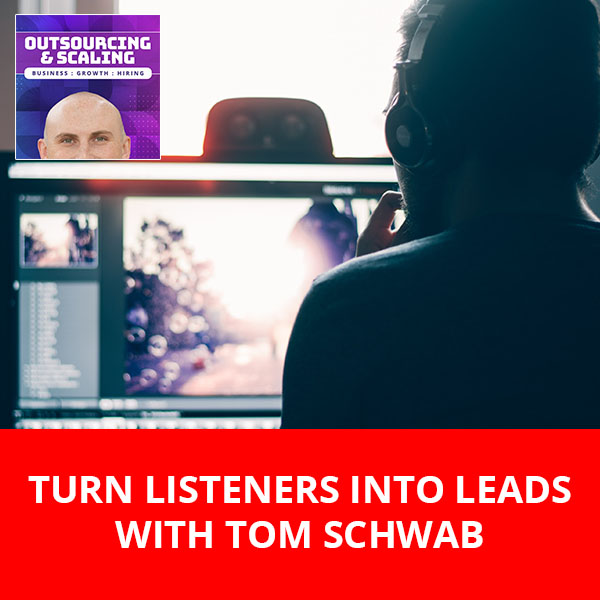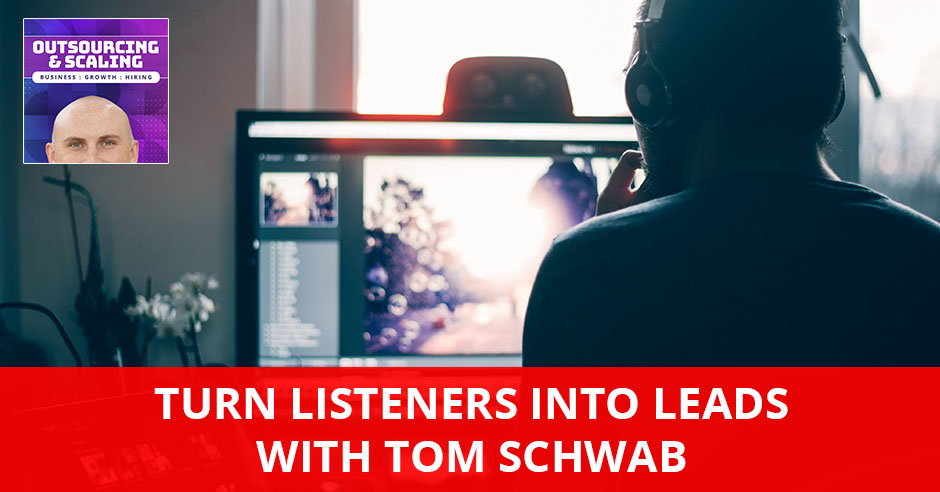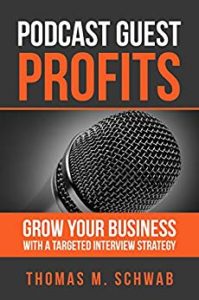


There are thousands of podcasts out there. How do you find, be on the ones with similar audiences as yours, and turn their listeners into leads? In this episode, the CEO of Interview Valet, Tom Schwab, talks about how he helps thought leaders, coaches, authors, speakers, and consultants get featured on leading podcasts through the Interview Valet System and convert listeners into customers. He elaborates on why and how outsourcing has been vital in scaling his business, and he shares how you can systemize your processes to utilize your Virtual Assistants better. Tom also touches on how to align your podcast with your business goals, start meaningful conversations, and what the future holds for the podcast industry.
—
Listen to the podcast here:
[smart_track_player url=”https://www.podetize.com/statsapi/www.podetize.com/wp-content/uploads/fileuploads/11-5b145ef137b51b3d1af0633e9305c43d/11/2019/b99129bc00e4ae6cae8fc2a8c1a1c5d9.mp3″ title=”Turn Listeners Into Leads With Tom Schwab” artist=”Nathan Hirsch” image=”https://freeup.net/wp-content/uploads/2019/04/OAS.png” ]
Download the audio file here.
Turn Listeners Into Leads With Tom Schwab
I’m here with Tom Schwab. Tom, how are you doing?
Nathan, I am doing wonderful. It’s always great to talk to you. This time we get to share it with the world.
We’ve used Interview Valet. We got on some great podcasts with it. I’m excited to share it with my audience. I know I always send people to you whenever they ask. For those of you that don’t know, Tom knows how to build an online business. He’s done it successfully several times. He now helps others find online success with podcast interview marketing. Marketing at its core is starting a conversation with someone who could be an ideal customer. Tom helps thought leaders, coaches, authors, speakers, consultants, emerging brands, marketplace owners get featured on leading podcasts their ideal prospects are already listening to.
The Interview Valet system helps them to turn listeners into customers. He is the author of GUEST PROFITS: Grow Your Business with a Targeted Interview Strategy. He’s the Founder and CEO of Interview Valet, a category king of the podcast interview marketing. I’m excited to talk to you about all of that. We’ll dive into it. I know you have a completely remote team as well, a combination of virtual assistants and staff in the US. First, let’s take a gigantic step back. What were you like growing up? Were you a rebel? Were you a straight-A student? Were you someone that you knew you wanted to be an entrepreneur?
I was a square peg in a round hole. I grew up in the suburbs of Chicago. I had this Mayberry lifestyle, about 40 miles west of the city. By the time I was seventeen, I hadn’t been more than about 100 miles from where I grew up. I knew the world was bigger than that. I wanted to see that. I’d have to say I was an entrepreneur because I got my first job mowing lawns when I was in second grade. Now when I see little kids, I’m like, “Who would let their kid mow a lawn at second grade?” By seventh grade, I realized I could mow lawns if I could get my friends to help me. That was my first business. I did a lot of caddying growing up, which was a great sales experience. I knew that there was more out there in the world. For me, my world changed when I went to the Naval Academy. I got in on a technical error. To everybody in the US, thanks for paying for my education. I came back by the time I was eighteen. I’ve been around the world. I spent a week in Australia and saw the possibilities out there.
You mentioned you had a lot of different businesses. What was your first business after joining the forces and what were the different businesses that you had?
When I left the Navy, I went from one stable career to another. That was the big thing growing up, find a stable job. I remember my dad called me a fool when I left the Navy. All you had to do was put another fifteen years and you could retire. I’m like, “I’d be dead in fifteen years.” I went for a corporate job, another secure job. When I left that with a family, a mortgage to go straight commission, he called me a fool or words to that effect. He lived long enough to say that was the right thing. I did the corporate world for a while, engineering sales. I had my distributorship. I loved that. That was my first business, but I had one customer.
In this digital age of automation, it’s the personal touch that makes the difference.
When the great recession hit in 2008, they wanted to go direct, cut out the middleman, which makes a whole lot of sense, until you look in the mirror and go, “I’m the middleman.” They did right by me and took care of me. I realized that I wanted to have more customers than that. We had a sideline business that we were selling in Michigan and I thought, “Could we go regionally to nationally?” That’s where I learned online business, inbound marketing. That was the first business. The second business was the evolution of what we had learned with inbound marketing and how we could use that with podcasts. That became Interview Valet.
How did Interview Valet get off the ground? What did that first year look like?
We all in hindsight have this perfect plan and said, “I had this perfect business plan.” The truth is it was just listening to the customers. When I was in my sabbatical phase, there were a few friends that said, “Could you help me with online marketing?” For them doing a blog was painful. I thought, “Could you use guest interviews like we used to use guest blogs to get out there? It worked well. They got good results with it. At first, I thought, “It’s a personality. It’s a niche. This won’t work.” As I more kept testing it, the more I thought, “This does work. It is a system.” I wrote the book and I put an online course.
I never took that course out of beta because what I was seeing was it was selling well, but people weren’t getting the results. When I would talk with them, I’m like, “Ask for your money back. I’ll give it to you back.” What they were telling me is, “You’ve given me a cookbook. You’ve given me the videos to do it, but I don’t want to be the chef. I want to go to a restaurant.” A client told me early on, “I want to be the guest. You take care of the rest. Why didn’t you do an agency that does this for us?” That was probably the first year of testing what didn’t work and testing a done-for-you agency. We took about six months to beta test that.
It started in the fall of 2015 and we took that out of beta in 2016. That’s what Interview Valet became. For us, that first year was defining the process and making sure that we had something that could scale, making sure that the market wanted it. That was the hard times because sometimes as founders, we’d be like, “I want to do this,” but you’ve got to listen to the market. You have an opinion. I have an opinion, but the true experts are our customers. They’re going to vote with their time, with their money and tell you what they love and what they loathe. I had to be smart enough to double down on one and stop doing the other one.
It’s similar to the Freedom marketplace, only in the sense that you have both sides. You got to fill the supply side, getting the actual podcasts and building those relationships. You have an obligation to them to get them great guests and your reputation there. You’ve got clients in the sales, in the marketing, you’ve got the retention of it. How are you able to account, structure and scale that over time, especially with all the new podcasts that are coming out in the way that industries go?

Some of it is learning from other businesses. What you left out from the bio was that I’m also a fan of FreeeUp. I love the business you have and how you intentionally build those relationships. You were working hard to get out there to get known. I call myself the CEO, the Chief Evangelist Officer. I would say that’s what you are. You’re out there building the relationships on both sides. You’re going to meet your team, but you’re also going out there with the customers. One of our core values is that in this digital age of automation, it’s the personal touch that makes the difference. This business has been like no other that I’ve built. When I had an eCommerce business, it was just building the machine and add the fuel. When you start putting people involved in it, it’s almost like raising a child.
When you start, you’ve got to do everything. With time, they start to do more and more. They’ll fall down and skin their knees. At a certain time, your business comes to you and says, “Can I have the keys to the car and will you get out of the driveway so I can get on with my job?” Some people struggle with that. Other people love that. It’s what you want out of it. If you’re going to scale, if you’re going to make more of an impact, it’s not just about doubling your hours. That isn’t scalable. You have to do that. It’s almost that analogy too of being a new parent. You stay up all night to do the things the kid needs, but that’s not scalable for the rest of their life. From that, it’s been more fun in the businesses. I’ve scaled it and got more people up there too.
I completely agree. Can you talk about how you structure it from a people perspective on your internal team? What do you use for your internal staff? I know they’re all remote. What do you use VA’s for or freelancers? Give the audience a good picture of that structure.
I am in Kalamazoo, Michigan. It’s halfway between Chicago and Kalamazoo. Most people have no idea where it is. Many years ago, we would have had been in LA or New York, one of the big centers. What I saw with my last company is that as much as I love this place, not everybody loves it. I can’t find the talent here nor can I reach out to a customer. We’ve got customers in Australia. We’ve got them in Asia, the Middle East. I can’t tell them, “Sorry, we’re shut down. We got ten inches of snow in Kalamazoo.” That’s not their problem nor do they understand what snow is, some of them. With that, we needed to have a global team in order to serve a global audience. I can’t tell somebody that our office is only open from 9:00 to 5:00 East Coast time. That’s ridiculous when you’re serving this. I always said that I wanted to find the best people I could.
To me, work now is what you do, not where you go. We look at that and say, “If it is a key integral part of our business, our account managers that deal with the clients all the time, our relationship managers that deal with the podcast hosts all the time, those are key internal functions that we keep within our team.” It’s hard to grow a team. It’s hard to scale a team. I would much rather leverage what you’ve done, Nathan and other things. We call them our overnight angels. I can give assignments to your team that my team needs during the day and you will do them overnight.
It’s like magic or there are things like research, graphic design and other things like that. There are people that are much better than us at that and it’s not our key area. Why wouldn’t I outsource that? To me, it’s much more scalable with that. The other thing that I didn’t appreciate with the remote team was the flexibility that it gave the team too. We have some people that are working for us because they like that flexibility. I can think of one team member that her mom got sick. She had to move back home for three months.
Bigger is not always better.
If she had a job, she would’ve had to leave that job. We had another team member that came to me and said, “My spouse got this great job offer in the Olympic Peninsula. Can I move there and take the job?” I’m not the most worldly guy. I’m like, “That’s fine. That’s no problem. How far is Greece ahead? Is that five or six hours ahead of East Coast time?” She’s like, “No, the Olympic Peninsula of Washington.” I’m like, “That’s easy. You could have moved there and I wouldn’t have known the difference.” Work is what we do, not where we go.
The VAs are perfect for the podcast industry. I use them to get on a lot of smaller podcasts. We use you for bigger ones. You can use them for sales and marketing, for leads on the client-side, finding experts, finding coaches, different stuff like that. If you’re a host, reaching out to people, all those stuff that take up way too much time as an entrepreneur if you can come up with a good system and process for it. Keep in mind it is one of those things where it’s trial and error. It’s split testing. It’s building the process better and better over time. VA’s are perfect for it. Would you agree?
I would agree. Build the process and also copy the process. You don’t have to start something from scratch. One of the things I love about your team is they’ve worked with other people. They’ve got processes. They know what works already. I remember you were a master of this. Before you’d go to a meeting, you’d be reaching out to people on LinkedIn, connecting with them, all the rest of that. I’m like, “I could do that same thing.” I’ve got a process and every time I go to a meeting, I reach out to Jan on your team and say, “This is the meeting I’m going to. Here’s the list of people that are going to be there. Here’s the list of speakers. Could you reach out for me and at least make that contact?” It’s the first time there’s a little bit of work to it, but after that, it’s magic. You sleep and the work happens.
We have a Facebook group called Outsourcing Masters. If anyone’s reading, feel free to join the group. One of the posts that I had was all about using VA’s for lead generation. I try to network with new people every day. I try to join new groups, be a part of a new community, reach out to different influencers and create these sheets over time of my hit list. We’re always adding to it. It can be people I meet at conferences or maybe I’m at a conference with them. I don’t get a chance to meet with them and they all get added to a database. When I wake up every morning, I have a list of people to contact. I go through. I have a list of what groups to join. I have a list of what links to post up in. It’s all very organized and over time, if you’re doing that stuff day in and day out, your network grows, your business grows, your audience grows. There are a lot of creative ways you can do it once you come up with a good system.
I love how you say that too because you want to work with people that don’t just take direction but also help empower you. It’s like when people say, “How many people do you have on the team? How many people work for you?” The question is, how many people do I work for? I love that when somebody comes and says, “This is what you need to do. I don’t have to think about it. Those are the high-level tasks that are important.” It’s not controlled. It’s a delegation and an empowerment model.
Let’s talk about the podcast industry. Where do you see it’s going? I have to be honest with you. People have been telling me for years to start a podcast. I thought it was at its peak a few years ago. I was on Entrepreneur On Fire. I was on all these podcasts. I’m like, “This is great, and this is awesome.” Are we at the peak? Does the world need more podcasts? It continues to go up and up. Where do you see the industry going? Why do you think it’s so effective?

I could say what my opinion is, but I would much rather repeat what I learned at Harvard University. Harvard had its first conference on podcasting. That’s amazing because a few years ago, when you said podcasting, people thought of Wayne’s World, two guys in their mom’s basement. Now Harvard is doing this. They had a keynote that talked about this as being the golden age of podcasting. They had so many corollaries to the golden age of radio to the golden age of television. Those people that are in it, they think, “It’s been around forever,” but the vast majority of people are just starting to see it. There are the opportunities out there, the support, the infrastructure behind it, the ecosystem, the analytics, even the monetization behind it.
We are so early on this. It’s only going to expand, but what’s going to be interesting is a few years from now, we’re going to look back and laugh at the word podcast. Is this a podcast where we’re talking with the video? If you put the video up, is that still a podcast? I asked my two youngest daughters awhile back, what’s the pod stand for in a podcast? They rolled their eyes and said, “I don’t know, Dad. What does it stand for?” The thing is they have never known a world with iPods. To them, they listened to it on their smartphone, in the car, on the web. To me, it’s going to mesh. It’s more content. The content was big when newspapers came out. The content was big when the printing press was invented and content is going to be big many years from now.
The magic thing is now it’s easy for us to create the content in the way that’s easiest for us and repurpose it in the way that’s easiest for our audience. I’ve written a whole lot of blogs in my life, but they were all a homework assignment. Now we can talk, we can transcribe these, we can have a VA, clean them up, post them and now it’s a blog. We can have them take clips out of it and now it’s an audiogram. We can have them take 140, 200 characters of wisdom and make tweets out of it. You’ve got to ask yourself, “Is that a podcast anymore?” I don’t know. All I care about is that people consume the content. Somebody asked me, when do you think podcasts will get to be 100%? Newspaper and radio never got to 100%. 10% of the US population is hearing impaired. They’re not going to listen to podcasts, but that doesn’t mean they won’t read the transcript of this and that they won’t consume it in other ways. To me, I think we are on the verge of what the golden age of podcasting can be. It’s fun to see it evolving.
What tips do you have for someone being a guest on podcasts? The first podcast I was on, I was scared. I didn’t know what I was trying to accomplish or what to share or anything like that. What tips do you have for someone like that?
I always say podcasts are an awful place to sell, but they’re a great place to get people to know you exist. Rand Fishkin from SEO Moz had the best tweet I’ve ever seen. He said, “The best way to sell something is not to sell anything but earning the awareness, respect and trust of those who might buy.” That’s what you’re trying to do. If you look back and say these tools amplify what we already know and what we do. You can either do it poorly or well. We get together in a meeting and somebody introduces you to me, we talk a little bit at the backstory. That works well. At the end of that, I’m like, “Nathan, that sounds great. I need that. How can I work with you?” The flip side is if you came in and started to sell me hard like you were selling life insurance, not only would I not buy from you, I would avoid you from then on.
Gary Vaynerchuk talks about “Jab, jab, jab right hook.” I probably missed a couple of jabs in there. I look at it as “Serve, serve, serve, ask.” If you serve the podcast host and make them look like a genius for having you on, by adding so much value, if you serve the audience with free offers and extra value there, if you serve the community by promoting the episode, by sharing it all the rest of that, you serve, serve, serving, all of a sudden people are going to ask, “How can I work with you?” To me, that’s the best way to do it. It was DJ Doug Sandler from Nice Guys on Business who gave the advice one time. He said, “Don’t promote yourself on the podcast. If you do a good job, I will promote you better than you ever could.” That’s so true because if I say I’m great, what comes across is, “That guy is vain.” If the podcast says it, the person they already know, trust and respect. That’s something that you could never get on your own. To me, it’s all we serve. Make the host look like a genius for having you there.
The richness of our lives is the richness of our relationships.
What about on the hosting side? We’re about 60 days into this podcast now. It’s a whole new world. It’s completely different from being a guest. For someone there who’s starting a podcast or they’re trying to get their podcast off the ground or they’ve never done it before, they’re on episode one, what advice do you have for them?
I’ll give a little disclaimer here that I have done over 1,200 podcast interviews and I still haven’t launched my podcast. Anybody that says doing a podcast is easy has either never done it or never done it well. Nathan, my hat goes off to you on the excellent podcast you have. Leave a rating and a review if you enjoy this, not just because it helps Nathan, but because it helps other people find it. My advice to podcasters is not based on my experience. It’s based more on the data that I’ve seen. The podcasts that are doing the best right now are the ones that are authentic conversations. This would be the same conversation you and I would be having if we were at the Traffic & Conversion Summit sitting down.
We would be having the conversation. You wouldn’t have a list of six questions that said, “I asked the same six questions to every guest.” When I started, that was podcasting. It worked well. We’ve evolved off of that. Be interested in being interesting. Bigger is not always better. Some of the best guests out there are the ones that you’ve never heard of before. The example I use, I love Dave Ramsey. He’s a great man with a great message. He’s helped a lot of people. If Dave Ramsey was on your podcast, I know every talking point he’s going to say there because he’s going to stick to that. If you introduce me to one of your friends that I have never heard of before, I guarantee I’m going to learn something different from them.
Anybody that’s coming up with a new podcast, I say make it conversational, make it interesting and introduce new voices to the community. The other thing on there too, from a selfish standpoint, if you got Dave Ramsey on your podcast, do you think he’d be interested in promoting it to his entire audience? Probably not. It’s probably one of ten podcasts or media appearances he’s doing that day. If you get somebody on that is a peer, that loves what you’re doing, you came on and talked with somebody that could be a huge fanboy for FreeeUp, not only now, but for years to come. I always say the richness of our lives is to the richness of our relationships. Use your podcast to build those relationships.
When we were planning out this podcast, we came up with these lists of questions and we’re like, “We’ll ask this one and this one.” By the end of episode three, I threw it all away. I’m like, “This is garbage. That’s not how I’m going to run an interview.” I’d much rather have the conversations and sometimes you go in with a plan like you’re coming on this podcast now. I was pretty confident we were going to talk about podcasting, but you had no idea what direction exactly is going to go and you’ve got to go with it.
For both sides, a lot of times we’ll tell the guest to ask beforehand to the host, “What do you hope to get out of this? How can I add the best value?” The host typically asks the guest the same thing. We’re figuring out where we want to go with this interview? What dance we’re going to do before the music starts? It’s not scripted. My corporate legal department did not sign off on this interview and all the questions. Yours didn’t either. These are two guys that are talking about things that interest them and hopefully will interest the people that are listening.

What else did I miss about the podcast industry? What else should people know that the average listener wouldn’t be aware of?
There are 700,000 podcasts out there right now and people are like, “That’s amazing.” Most podcasts die within the first ten episodes. There are 250,000 that have published in the last 30 days. You want to be very careful about what podcasts you work with. Bigger is not better, more is not better and be very targeted. We’ve talked about this. The things that we look for on being on a podcast guest of look at the podcasts, look at the website for the backlinks, look for the social media, the reach, how much are they promoting it, things like that. From that standpoint, the overarching thing that I would say to everyone is I believe that everyone’s biggest problem is obscurity.
With our current product service offering, there are thousands or millions of people we could help. The biggest problem is they don’t know we exist. The question is do you try breaking through the noise or do you try getting in on a conversation that they’re already listening to? Honestly, I believe that most of the time, when I try breaking through the noise, I’m adding to it. I’d much rather get in on the conversation that people are listening to get introduced by somebody that’s already their friend. Some people are introverts, some people are extroverts. Some people wouldn’t want to be on stage talking to 100 people but would be comfortable being on a podcast interview talking to thousands or tens of thousands. To me, it’s never been easier to learn or to share what you know, either as a podcast guest, a podcast host, or both.
Tom, where can people find out more about you and what are you most excited about?
Everything that we talked about here, go to InterviewValet.com/outsourcing. That’s something that we have learned is that make it easy for people to go there. I’ll put a free copy of the book, the checklist that we give for all of our clients. Checklists are written in blood. Make sure it’s somebody else’s blood. Learning from your own mistakes is painful. Learn from somebody else’s. I’ll also put out there all my social media and my calendar links. If there’s anything I can do to help you or this resonates with you, let’s connect. The thing that I am most excited about for the future is the technology and ease that things have gotten.
We should pinch ourselves every day. There are a lot of problems in the world, but there’s no better time to be alive. If I’ve got a business idea, I can get out and talk to thousands, tens of thousands of ideal customers on a podcast. I can scale up my business by calling Nathan and saying, “This is the type of team I need.” I can have them build a website, do the lead gen, all the rest of that. There is no other time in the world that has been possible. If you’re isolated or ignorant, it’s by choice. I am more and more excited about the next decade than I was in the previous decade. The richness of your life is the richness of your relationships. Because of that, my life keeps getting richer and richer every day and I encourage other people to do the same thing.
Thanks so much, Tom. I appreciate your time.
Thank you, Nathan.
Important Links:
- Interview Valet
- GUEST PROFITS: Grow Your Business with a Targeted Interview Strategy
- Outsourcing Masters
- Entrepreneur On Fire
- Moz
- Nice Guys on Business
- Traffic & Conversion Summit
- InterviewValet.com/outsourcing
- FreeeUp
About Tom Schwab
 Tom Schwab knows how to build an online business. He’s done it successfully several times, and now helps others find online success with podcast interview marketing.
Tom Schwab knows how to build an online business. He’s done it successfully several times, and now helps others find online success with podcast interview marketing.
Marketing at its heart is starting a conversation with someone who could be an ideal customer. Tom helps thought leaders (coaches, authors, speakers, consultants, emerging brands) get featured on leading podcasts their ideal prospects are already listening to.
The Interview Valet system then helps them to turn listeners into customers. The author of Podcast Guest Profits: Grow Your Business with a Targeted Interview Strategy, Tom is also Founder/CEO of Interview Valet, the category king of Podcast Interview Marketing.
